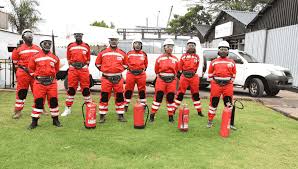Fire Fighting System Training for Operators and Technicians Course
Fire Fighting System Training for Operators and Technicians course is a hands-on, competency-based training program designed to equip personnel with the technical expertise and operational skills required to install, maintain, inspect, and operate modern fire protection systems.

Course Overview
Fire Fighting System Training for Operators and Technicians Course
Introduction
Fire safety is a critical aspect of industrial, commercial, and residential environments. Fire Fighting System Training for Operators and Technicians course is a hands-on, competency-based training program designed to equip personnel with the technical expertise and operational skills required to install, maintain, inspect, and operate modern fire protection systems. With the increasing complexity of fire safety standards and systems, it is essential for technicians and operators to be certified, up-to-date, and capable of responding quickly and effectively during emergencies.
This industry-leading course integrates NFPA guidelines, smart safety technologies, and practical exercises. It prepares participants to manage fire detection systems, fire suppression technologies, and emergency response protocols with accuracy and confidence. From understanding the basics of fire chemistry to operating advanced suppression tools like FM-200 and sprinklers, this training is tailored to meet the safety demands of today’s built environment.
Course Objectives
Participants will be able to:
- Understand the components of fire fighting systems and their operational principles.
- Identify different fire classification types and corresponding extinguishing agents.
- Install and maintain fire suppression systems including sprinklers and gas-based agents.
- Interpret NFPA codes and standards for compliance and safety auditing.
- Operate fire alarm panels and detection systems effectively.
- Perform routine inspections and preventive maintenance of fire protection systems.
- Troubleshoot fire pump systems and valves.
- Develop and execute emergency response and evacuation plans.
- Understand smart fire system integration with IoT and cloud monitoring.
- Apply risk assessment to fire hazard zones.
- Document fire safety audits and generate compliance reports.
- Calibrate fire detection sensors and test system functionality.
- Communicate with fire safety authorities and incident management teams.
Target Audience
- Fire System Operators
- Facility Technicians
- Maintenance Engineers
- HSE Officers
- Industrial Safety Inspectors
- Emergency Response Coordinators
- Electrical/Mechanical Technicians
- Building Management System (BMS) Professionals
Course Duration: 5 days
Course Modules
Module 1: Basics of Fire and Fire Dynamics
- Fire triangle and tetrahedron
- Stages of fire development
- Types and classes of fire
- Combustion materials and reactions
- Heat transfer mechanisms
- Case Study: Analysis of the Grenfell Tower Fire - Key learnings on fire spread dynamics.
Module 2: Fire Detection and Alarm Systems
- Smoke, heat, and flame detectors
- Fire alarm control panels (FACP)
- Manual call points and horns/strobes
- Zoning and detection logic
- Testing and calibration procedures
- Case Study: Hospital alarm malfunction incident and corrective retrofitting.
Module 3: Fire Suppression Systems
- Sprinkler systems (wet/dry)
- FM-200 and clean agent systems
- CO2 suppression systems
- Foam and water mist systems
- Activation mechanisms and maintenance
- Case Study: Clean agent suppression in a data center – risk mitigation.
Module 4: Fire Pumps and Hydrant Systems
- Jockey, main, and diesel pumps
- System pressure requirements
- Flow testing and maintenance
- Standpipe and hydrant integration
- Valve types and configurations
- Case Study: Industrial warehouse fire pump failure analysis.
Module 5: NFPA Standards and Legal Compliance
- Key NFPA codes (NFPA 10, 13, 20, 72)
- Local regulations and safety codes
- Compliance audit process
- Documentation and reporting
- Penalties and fire inspection failures
- Case Study: Legal review of a commercial property shutdown due to non-compliance.
Module 6: System Inspection and Troubleshooting
- Routine inspection checklists
- Common system faults
- Troubleshooting methods
- Repair and part replacement
- Preventive maintenance practices
- Case Study: Oil refinery fire panel failure — diagnostics and solution.
Module 7: Emergency Response Planning
- Evacuation procedures
- Fire drills and simulation
- Command and communication roles
- Assembly points and headcounts
- Role of first responders
- Case Study: Successful evacuation during a mall fire – what went right.
Module 8: Smart Technologies in Fire Protection
- IoT and fire systems
- Remote monitoring and alerts
- Predictive analytics for fire risk
- Integration with BMS and SCADA
- Cybersecurity in fire systems
- Case Study: Integration of AI-powered fire sensors in smart buildings.
Training Methodology
- Interactive Lectures with real-world fire case discussions
- Hands-on Lab Sessions for equipment operation and inspection
- Virtual Simulations of fire scenarios and suppression
- Group Activities & Drills for team coordination and emergency response
- Assessment & Certification based on practical and theoretical tests
Register as a group from 3 participants for a Discount
Send us an email: [email protected] or call +254724527104
Certification
Upon successful completion of this training, participants will be issued with a globally- recognized certificate.
Tailor-Made Course
We also offer tailor-made courses based on your needs.
Key Notes
a. The participant must be conversant with English.
b. Upon completion of training the participant will be issued with an Authorized Training Certificate
c. Course duration is flexible and the contents can be modified to fit any number of days.
d. The course fee includes facilitation training materials, 2 coffee breaks, buffet lunch and A Certificate upon successful completion of Training.
e. One-year post-training support Consultation and Coaching provided after the course.
f. Payment should be done at least a week before commence of the training, to DATASTAT CONSULTANCY LTD account, as indicated in the invoice so as to enable us prepare better for you.